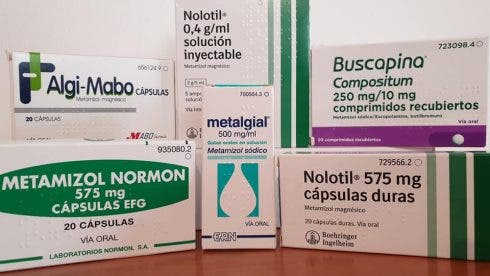Have you been affected by Nolotil? Email us: tips@theolivepress.es
SINCE the death of British expat Mark Brooks, Nolotil is on many people’s minds, but what can you do to avoid the drug?

Spain’s most popular medicine, Nolotil, is sold everywhere.
Although fine for most Spaniards, the drug can have severe consequences for Northern Europeans.
Some 40 British and Irish expats are believed to have died as a result of Nolotil, which can weaken your immune system, provoke sepsis and lead to organ failure.
Just last year, Brooks, 42, died after taking the drug for a shoulder injury.

Despite a 2018 directive supposedly stopping medical professionals giving expats the painkiller, many continue to receive the drug.
Anti-Nolotil campaigner, Cristina del Campo, told the Olive Press: “It happens all the time.
“Chemists give it without a prescription, even when patients say they are allergic to it in their notes, doctors still administer Nolotil. You really have to keep an eye on it.”
So, what can you do to avoid being given the drug?
If you are going into hospital for whatever reason, the first step is to go to Atencion al Paciente to register your ‘allergy’ to Nolotil – which is a form of metamizol.
They are many brand names of the drug to look out for such as Nolotil, Buscapina Compositum, Algo-Mabo and Metalgial.
The sensitivity most northern Europeans have to the medication must be registered as an allergy as it does not affect all populations.
Atencion al Paciente is a hospital’s customer service area, so if you have any doubts, speak to someone there.
Even still, Cristina claims many doctors just ‘glance’ at their notes and often do not realise they cannot administer Nolotil.
The medical translator, who has been campaigning against Nolotil for seven years, urges patients to stand up for themselves, letting doctors know throughout their treatment they cannot be given the drug.
She said: “People were shy before. Now, they will tell doctors they are allergic to it, they are more worried about fighting for their rights and looking after themselves.”
As well as this, many expats wear bracelets saying ‘No Nolotil’, sold by Cristina’s campaign organisation, Association for Drug Affected People (ADAF).

“It’s amazing because there’s two little things, Nolotil and the bracelet. One is capable of saving your life and the other of killing you. Sometimes the doctors don’t check your notes or they don’t care, but if you’re wearing it, it’s much harder to ignore,” she told the Olive Press.
According to the campaigner, there are still instances where Brits are given the drug.
The Olive Press has also received dozens of reports from concerned expats who have been given the drug since a 2018 directive advised medical professionals to stop giving Nolotil to northern Europeans.
Although it is not banned to administer the drug to Brits, it can only be given on a short term prescription, after a detailed analysis of the patient’s medical history and heritage.
This includes a consideration of their susceptibility to negative side effects like those suffered by many northern Europeans given the painkiller.
One Olive Press reader, Lynn Reeves, claims she was prescribed Nolotil after a surgery in Murcia Hospital last December.
She said: “Because of your previous campaigns I knew it was not supposed to be prescribed to English people or Northern Europeans and I told the doctor to remove it.”
Despite this, the drug was still present when her husband picked up the prescription.
Although he questioned this, he was still handed over the deadly drug.
“Why aren’t medics being constantly reminded of these dangers”, she asked.
“There will be many patients who have no idea about Nolotil.”
Lynn had a lucky escape thanks to the Olive Press, but if she had been given Nolotil in hospital, it could have been a different story.
She said: “The problem is in the hospitals they can just give it to you intravenously or by tablet without actually telling you what they are giving you. They never actually said what they were hanging up on my intravenous drip.”
What can I do if I am given Nolotil?
That’s why she claims it is of the utmost importance to keep detailed records of the medication you are given and the doctors administering it.
Then, if you are offered or given Nolotil while in hospital, you can file a complaint with the facility’s Atencion al Paciente desk.
This report should be communicated to the doctor in question, who Cristina hopes ‘will think twice next time’.
A similar procedure follows if you are prescribed Nolotil or given it over the counter.
You should report the case to the pharmacy or health facility to make an ‘official complaint’.
Cristina also urges victims of Nolotil or those who have had near misses with the drug to report their case to the ADAF.
She said: “If people file a report by themselves, not much will happen, but if they report it with me, I can use it as proof, because I’m suing the government and I’ve filed a criminal case.
“We need to know which doctor, hospital, health facility or chemist is doing this. They need to be reported. And I think if people start rebelling against them and reporting it, things will change. Every little helps.”
The advice comes as Cristina launches a criminal complaint against the Spanish government for their ‘negligence’ over the drug and the deaths of many expats.
The Olive Press has also just launched their second campaign for tougher rules on Nolotil and to urge health facilities to join our pledge to follow the 2018 directive.
You can buy a ‘No Nolotil’ bracelet by emailing notonolotil@gmail.com. For more information or to report a case, visit ADAF or Cristina Research Information on Facebook.
Have you been affected by Nolotil? Email us: tips@theolivepress.es
READ MORE:
- ‘Our Nolotil hell’: British expats recall their terrifying ordeals after taking the ‘lethal’ painkiller in Spain – including one who ‘momentarily died’ before having to learn to walk again
- EXCLUSIVE: ‘Nolotil shouldn’t be sold like shampoo’: Campaigner Cristina Del Campo blasts ‘serious corruption’ in her fight against Big Pharma
- What is Nolotil? The painkiller sold in Spain that’s been linked to dozens of British deaths








